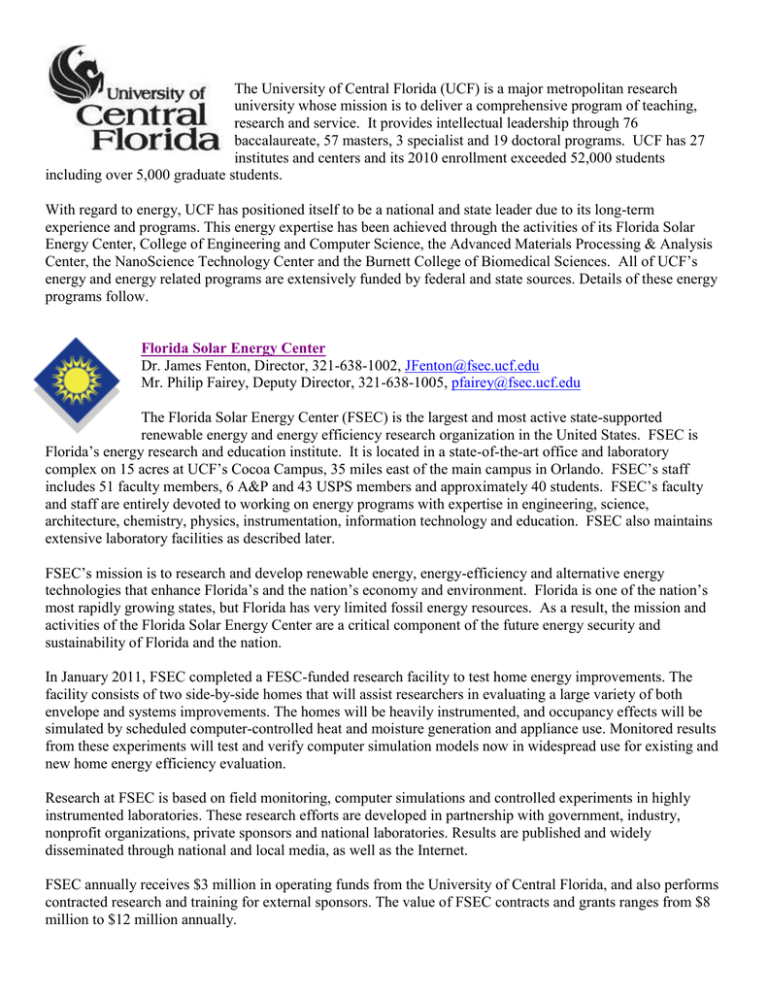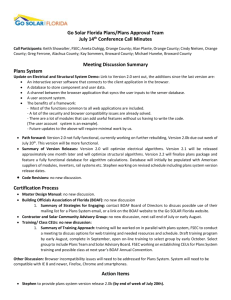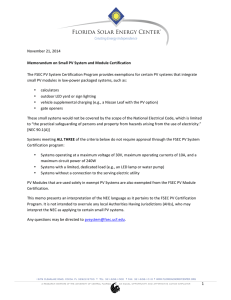The University of Central Florida - Florida Energy Systems Consortium
advertisement

The University of Central Florida (UCF) is a major metropolitan research university whose mission is to deliver a comprehensive program of teaching, research and service. It provides intellectual leadership through 76 baccalaureate, 57 masters, 3 specialist and 19 doctoral programs. UCF has 27 institutes and centers and its 2010 enrollment exceeded 52,000 students including over 5,000 graduate students. With regard to energy, UCF has positioned itself to be a national and state leader due to its long-term experience and programs. This energy expertise has been achieved through the activities of its Florida Solar Energy Center, College of Engineering and Computer Science, the Advanced Materials Processing & Analysis Center, the NanoScience Technology Center and the Burnett College of Biomedical Sciences. All of UCF’s energy and energy related programs are extensively funded by federal and state sources. Details of these energy programs follow. Florida Solar Energy Center Dr. James Fenton, Director, 321-638-1002, JFenton@fsec.ucf.edu Mr. Philip Fairey, Deputy Director, 321-638-1005, pfairey@fsec.ucf.edu The Florida Solar Energy Center (FSEC) is the largest and most active state-supported renewable energy and energy efficiency research organization in the United States. FSEC is Florida’s energy research and education institute. It is located in a state-of-the-art office and laboratory complex on 15 acres at UCF’s Cocoa Campus, 35 miles east of the main campus in Orlando. FSEC’s staff includes 51 faculty members, 6 A&P and 43 USPS members and approximately 40 students. FSEC’s faculty and staff are entirely devoted to working on energy programs with expertise in engineering, science, architecture, chemistry, physics, instrumentation, information technology and education. FSEC also maintains extensive laboratory facilities as described later. FSEC’s mission is to research and develop renewable energy, energy-efficiency and alternative energy technologies that enhance Florida’s and the nation’s economy and environment. Florida is one of the nation’s most rapidly growing states, but Florida has very limited fossil energy resources. As a result, the mission and activities of the Florida Solar Energy Center are a critical component of the future energy security and sustainability of Florida and the nation. In January 2011, FSEC completed a FESC-funded research facility to test home energy improvements. The facility consists of two side-by-side homes that will assist researchers in evaluating a large variety of both envelope and systems improvements. The homes will be heavily instrumented, and occupancy effects will be simulated by scheduled computer-controlled heat and moisture generation and appliance use. Monitored results from these experiments will test and verify computer simulation models now in widespread use for existing and new home energy efficiency evaluation. Research at FSEC is based on field monitoring, computer simulations and controlled experiments in highly instrumented laboratories. These research efforts are developed in partnership with government, industry, nonprofit organizations, private sponsors and national laboratories. Results are published and widely disseminated through national and local media, as well as the Internet. FSEC annually receives $3 million in operating funds from the University of Central Florida, and also performs contracted research and training for external sponsors. The value of FSEC contracts and grants ranges from $8 million to $12 million annually. FSEC’s programs are both nationally and internationally recognized. There are five major program areas – photovoltaics, energy efficient buildings, hydrogen and fuel cells, solar thermal technologies and education. Brief descriptions of these areas follow. Energy Efficient Buildings Research Mr. Rob Vieira, Division Director, 321-638-1404, robin@fsec.ucf.edu The FSEC Buildings Research Division conducts programs that cover virtually every aspect of building science and building energy. Diverse activities include research on heating and air conditioning equipment, air distribution systems, insulation envelopes, efficient windows, lights, daylighting, appliances, and control systems. Integration of building systems produces high-quality and energy-efficient homes, schools and commercial buildings. The Buildings division has strong capabilities in diagnostic field-testing, the development of user-friendly building energy analysis software, short- and long-term performance monitoring and equipment testing in controlled laboratory facilities. FSEC's building research programs include the Building America …and after Industrialized Housing Partnership with the U.S. Department of Energy, Energy Star Homes with EPA, Before retrofit… …and after building code and energy rating software development for the Florida Energy Office, EnergySmart Schools program with U.S. Department of Energy and numerous monitoring programs for Florida utility companies. Major building energy programs are as follows. Building America Industrialized Housing Project The Building America Industrialized Housing Partnership (BAIHP) team is the only university-based Building America team competitively funded by the U.S. Department of Energy (DOE). BAIHP works with partners throughout the United States and has the goals of: Performing cost shared research to reduce the energy cost of housing by 30% to 70% while enhancing indoor air quality, durability, resource efficiency and marketability. Assisting in the construction of thousands of energy-efficient industrialized houses annually and commercialize innovations. The BAIHP program has improved 136,252 homes for a total energy savings of $22,635,864. Please visit out website at http://www.baihp.org. Zero Energy Buildings Zero Energy Homes (ZEH) are homes designed to use zero net energy from the utility grid. The concept is simple — couple the maximum possible building energy efficiency with the best available renewable energy resources in a way that maximizes the effectiveness of both. FSEC's first Zero Energy Home was built in Lakeland, Florida in 1998. There is now a new generation of Zero Energy Homes being designed and constructed around the country under the sponsorship of DOE and the National Renewable Energy Laboratory (NREL) in Golden, CO. A primary aim in each of these ZEH projects is to collect detailed performance data that will allow refinement of the approach for integrating energy efficiency measures with PV and solar thermal systems. FSEC is presently taking data from ZEH homes located in Lakeland, Florida; Livermore, California and New Smyrna Beach, Florida. Energy Gauge Energy Gauge is a family of user-friendly PC software tools developed by FSEC and supported by the Florida Energy Office. The PC tools allow simple yet detailed performance-based analysis of building energy use and perform economic analysis of proposed energy improvements. Energy Gauge will perform Energy Code calculations and compliance reports, Building Energy Ratings and Rating reports, and economic analysis of building energy improvements. There are two basic configurations of Energy Gauge software: Florida-specific versions, for both Florida residential (FlaRes) buildings and Florida commercial (FlaCom) buildings, which are applicable only in Florida, and Energy Gauge USA, which is applicable nationwide. The Florida residential software, EnergyGauge FlaRes, provides residential building Method A Florida Energy Efficiency Code calculations and reports. A Pro version adds ACCA Manual J (Version 8) load calculations and economic analysis features. The Florida commercial software product, EnergyGauge Summit FlaCom, provides commercial building Method A Florida Energy Efficiency Code calculations and reports. A Florida commercial and public building rating system version, ComFree adds building rating capabilities (available to certified raters only). EnergyGauge Summit Premier offers energy analysis for federal tax deduction. The USA residential software product, EnergyGauge USA, provides residential building annual energy use and IECC code calculations and reports for the entire nation. A Pro version of the software includes pollution analysis and tax credit qualification reports, and a rater version includes HERS ratings. Energy Efficient Schools FSEC has researched energy efficiency in schools for the Florida Department of Education, the Florida Energy Office, and the National Association of State Energy Officials. These studies examined the potential of various technologies to reduce energy use, cost, and improve the learning environment in educational facilities. The research has collected data on energy use (kWh and kW demand), interior comfort conditions (temperature and relative humidity), indoor air quality, and lighting. The results of the school’s research produced the following output: Energy Efficient Design for Florida Educational Facilities. Performance Enhanced Relocatable Classrooms Indoor Air Quality Diagnostic Testing of Schools and Classrooms Utility Report Cards Reflective Roofing Technology Occupancy Sensor Study Energy Efficient Portable Classrooms. Green Standards Green standards go beyond just energy efficiency and attempt to rate a building effort with regard to the total environmental stewardship of a project. FSEC has been helping create guidelines, programs and standards for building better buildings. As an early member of the United States Green Building Council (USGBC), FSEC staff served on the committee that developed LEED 1.0, the first U.S., nationally available, commercial green building standard. FSEC staff helped found the Florida Green Building Coalition (FGBC), a non-profit Florida Corporation dedicated to developing green standards for environmental and economic benefit of Floridians. After researching the various local green building standards at the time, FSEC headed the effort to create a green home building program for Florida. The FGBC green home standard is now being specified for entire developments, and the City of Gainesville has provided incentives for building to the standard. Fenestration FSEC has studied the energy and illumination performances of fenestration systems. The main focus is on solar heat gain from natural lighting and its effects on the thermal performance of buildings and energy costs for heating and cooling. The work also includes studies on daylight illumination and performance assessments of complex piped daylighting systems. Due principally to Florida's generally hot climate, a special focus of FSEC’s research is on applications such as shading devices and advanced glazings that are spectrally selective. Gossamer Wind Series Ceiling Fans Ceiling fans are very popular in American households. They are decorative and they provide enhanced comfort. The Gossamer Wind was conceived by FSEC’s Danny Parker as a means of realizing the energy efficiency and comfort potential of ceiling fans. The Gossamer Wind series ceiling fans can provide significant energy savings. Compared to conventional ceiling fans, they consume approximately half the energy in operation, saving an estimated $20 per year in electricity costs while providing the same or greater air velocities. To date, more than half a million Gossamer Wind ceiling fans have been purchased across the country, saving users more than $10 million annually. These savings can be further augmented by the reduced air conditioning from raising thermostat temperatures. This is possible since the enhanced airflow allows people to be equally comfortable at temperatures that are 2-4 °F higher. The Gossamer Wind Series is currently available at Home Depot stores across the nation in several models and all have an Energy Star efficiency rating. The Gossamer fan is the most successful patent at UCF.


